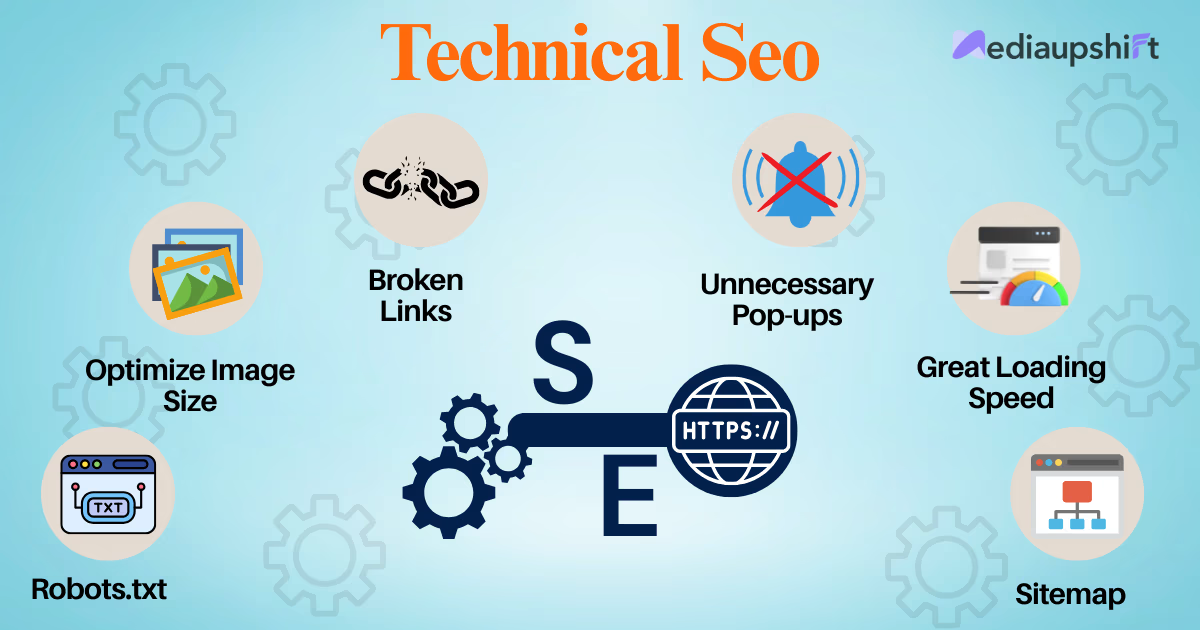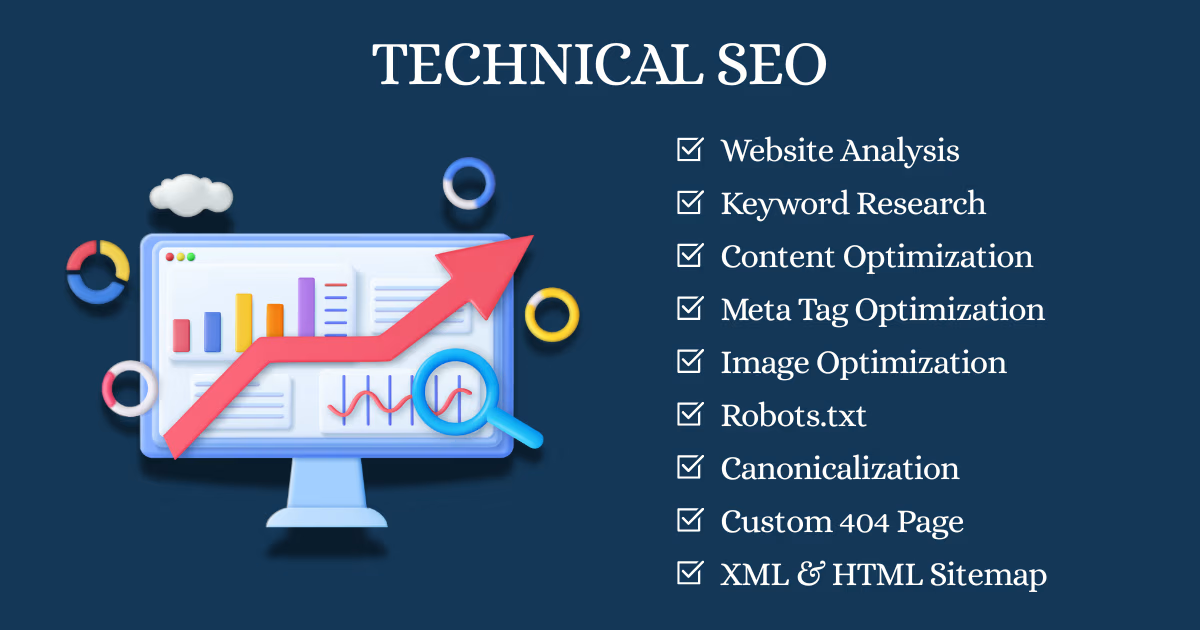What Is Technical SEO? Why It’s Crucial for Rankings
Published on: 07 Aug, 2025

Search engine optimization has become a necessity in today's busy times, as it gets your website noticed, brings in organic traffic, and places your brand front and centre whenever any user searches for products, services, or solutions that you offer. Most marketers think that content and keywords are everything(they are crucial), but the one that's usually overlooked is Technical SEO.
This is what makes your site crawlable, indexed and rank higher, and without it, even the best content can go undiscovered. This blog will tell you all about Technical SEO and how this will be the game changer that will climb you to the top of Google search results.
What Is Technical SEO?
Technical SEO focuses on optimizing the technical aspects of a website to ensure that the foundation is solid, allowing search engines to effectively discover it, making it more visible, ranking it in SERPs, and displaying your content to users. This includes optimizing site architecture, URL structure, page speed, mobile responsive design, and structured data which makes your website faster, easier to crawl and index for search engines.
To differentiate it from the rest:
On-page SEO = Optimizing the content and keywords
Off-page SEO = Making backlinks and earning domain authority
Technical SEO = Ensuring that everything on that website works perfectly
In Really Simple Words:
Think of it as a Metro system, here your content is the train and the backlinks are the stations. The core role is played by Technical SEO, which is the rails, wiring, and control room, if it fails, the whole system breaks down.
Core Elements of Technical SEO
i. Site Structure and Architecture
If you have a well-organized site structure, it makes it easy for both the users as well as the search engines to look through your content. You can use clear menus, internal links, and a logical URL that will help Google to run through your pages faster.
ii. Page Speed and Performance
Page speed is really important and it directly affects the user experience and the rankings too. A slow-loading website will have higher chances of bounce rates and reduced conversions. You can optimize the page speed by compressing images, enabling caching and using a Content Delivery Network (CDN) to make it run faster.
iii. Mobile-Friendly
Google primarily checks out your website based on its mobile version. If your website has a responsive design, is easy to navigate, loads faster, and contains legible font, then it will help your site perform well on smartphones and tablets.
iv. Secure Website (HTTPS)
HTTPS ensures that the data that’s getting exchanged between your site and the users is encrypted and fully secure. Google considers it as a ranking signal, and the users are more likely to trust and engage with a secure website.
v. Crawlability and Indexation
Search engines like Google, use bots to crawl and index your content and a proper use of robots.txt, sitemaps, internal links, and tags can ensure they can access and understand your pages with ease. Blocking or misusing such tags can harm your visibility and put it at risk.
vi. Fixing Technical Errors
Technical SEO involves identifying and fixing issues like sitemap.xml, 404 error, broken links, redirect chains, duplicate content, server errors, and orphaned pages. These errors can confuse the search engines and negatively impact user experience. Regular or frequent audits will help you catch such issues and ensure that your site stays optimized and free from such problems.
Why Technical SEO Is Crucial for Rankings

Technical SEO plays a very basic and foundational role in how well your website performs in search engines. Without it, even the best content may go unseen and here's some of the reasons why it's so essential:
1. Enables Proper Crawling and Indexing
If search engine bots can’t access or understand your pages, then no matter how good your content is, they won’t appear in search results.
2. Fixes Hidden Barriers to Ranking
Slow loading, broken links, or duplicate content can severely affect and sabotage your ranking and technical SEO help you identify and resolve these blockers.
3. Boosts User Experience
Google rewards websites that load quickly, are mobile-friendly, and secure so it pushes them to the top. These technical elements are a direct ranking factor.
4. Unlocks Advanced SEO Features
Structured data enables the AI Overview to choose your content like ratings and FAQs, which increases visibility and CTR in SERPs.
5. Supports On-Page and Off-Page SEO
A proficient website will give you stability and structure for content and backlink strategies to succeed.
Signs Your Website May Have Technical SEO Issues
Watch out for these red flags that might help you figure out if you have some deeper technical SEO problems on your site, or not:
- Slow page loading leads to higher chaser of facing bounce rates and they can impact your rankings on both desktop and mobile.
- Important pages being missing from search results could mean crawl blocks, incorrect no index tags, or issues with your sitemap.
- Having frequent 404 errors, server errors, or redirect issues suggest that search engines are struggling to access some parts of your site.
- Non-responsive design or overlapping elements can harm your mobile SEO and user experience as well.
- A decline after a website update could be due to broken links, missing pages, or duplicate content issues.
- Having repetitive or low-value pages can dilute your overall SEO strength and really confuse the search engines.
- Broken internal links can easily disrupt your site’s structure and can prevent search engines from fully crawling through your content.
How to Improve Technical SEO
Here are some of the ways that might help you improve Technical SEO:
- You can start by running a comprehensive audit of your website. Tools like Google Search Console, Screaming Frog, Ahrefs, and Semrush can help you see issues related to page speed, mobile usability, broken links, duplicate content, and indexing problems. These audits highlight what needs fixing first.
- You need to prioritize and start with page speed optimization by compressing images, enabling caching, using a CDN, and minimizing scripts. Also, you need to ensure that your site is mobile-responsive, as Google prioritizes it the most.
- Check your robots.txt and XML sitemap to ensure that your key pages aren't blocked or marked “noindex.” Add schema markup to boost visibility with rich snippets.
- Regularly monitor your site using Google Search Console for any other errors. Technical SEO requires ongoing maintenance, especially after site updates or new content uploads.
- Collaborate with web developers to resolve advanced technical issues. This ensures your website remains healthy, competitive, and always ready to rank.
Conclusion
Technical SEO is the invisible backbone that ensures everything, from keywords to backlinks, everything actually functions properly. If you enhance your site’s technical health, you’re not only increasing your chances of climbing the rankings but also creating a smoother, faster, and more secure experience for your users.
If it’s been a while since you’ve checked up on your website, then now’s the perfect moment to do so. And when you talk about SEO, it’s not just about what you say but also how effectively your site delivers that message to get you ranking.
Frequently Asked Questions
What’s the difference between technical SEO and on-page SEO?
Technical SEO focuses on backend site performance which is the speed and crawlability, while on-page SEO focuses on visible content like the keywords or the headings.
Do I need coding knowledge for technical SEO?
Not necessarily, but a basic understanding helps. Tools and SEO plugins make most fixes accessible without requiring any deep coding skills.
How often should I audit my website for technical SEO issues?
Ideally, quarterly. But after any major site update or traffic drop, you need to run an audit immediately.
Can technical SEO alone get me to rank #1?
No. It’s essential but not sufficient. Technical SEO supports content and link-building efforts but it doesn't replace them.
Is HTTPS really important for rankings?
Yes. Google considers it a ranking factor and users trust secure websites more.
Need help with a technical SEO audit or strategy? Contact MediUpShift or get in touch from our website and we’ll help get your site search-ready!